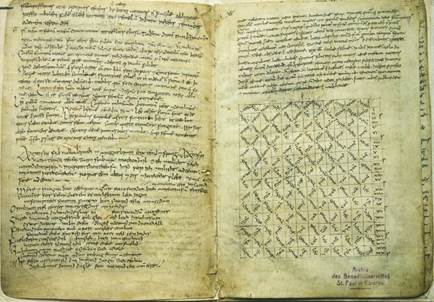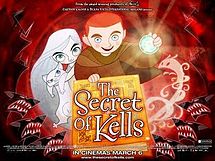
Best viewed in
Internet Explorer
PDF
Back to

Updated
06/25/2014 |
Pangur Bán
Pangur Bán is said to be the most famous poem in Old
Irish, written about the 9th century at or around Reichenau Abbey.
Reichenau Island is in Lake Constance in southern Germany. The
Benedictine Abbey of Reichenau was founded in 724 by the itinerant Saint
Pirmin, who is said to have fled Spain ahead of the Moorish invaders.
The poem was written by an Irish monk about his cat, Pangur Bán.
In 8 verses of four lines, the
author compares the activities of his cat to his own scholarly
activities; Pangur hunts for mice, while the monk hunts for words and
knowledge.

The poem is
preserved in the Reichenau Primer, pictured above open to the page with
the poem (lower left) and is now kept in St. Paul's Abbey in the
Lavanttal. The book appears to have been a practice workbook in which
the anonymous monk wrote down Latin hymns, grammatical texts, Greek
language declination tables, astronomical tables, as well as Old Irish
poems among them Pagur Bán.
It is written in
insular script similar to that in more famous works like the Book of
Kells. The style of the poem is said to be similar to the poetry of
Sedulius Scottus. Scotus was, during the reign of the Emperor Lothair
(840-855), one of a colony of Irish teachers at Liège.
A critical edition
of the poem was published in 1903 by Whitley Stokes and John Strachan in
the second volume of the Thesaurus Palaeohibernicus. The most
famous of the many English translations is that by Robin Flower (below).
In W. H. Auden's translation, the poem was set to music (for voice and
piano) by Samuel Barber as the eighth of his ten Hermit Songs
(1952-3).
Fay Sampson wrote a
series of children’s books based on the poem. They follow the adventures
of Pangur Bán, his friend, Niall the monk, and Finnglas, a Welsh
princess.






In the 2009
animated movie The Secret of Kells, which is heavily inspired by
Irish mythology, one of the supporting characters is a white cat named
Pangur Bán who arrives in the company of a monk.
It
was nominated for the Academy Award for Best Animated Feature.
A verse of
the poem is read out during the credit roll.

|
Old Irish
Text
Messe [ocus] Pangur
bán,
cechtar nathar fria saindán;
bíth a menma-sam fri seilgg,
mu menma céin im saincheirdd
Caraim-se fós, ferr
cach clú,
oc mu lebrán léir ingnu;
ní foirmtech frimm Pangur bán,
caraid cesin a maccdán.
Ó ru-biam scél cén
scis
innar tegdias ar n-oéndis,
táithiunn dichríchide clius
ní fris 'tarddam ar n-áthius.
Gnáth-huaraib ar
greassaib gal
glenaid luch ina lín-sam;
os me, du-fuit im lín chéin
dliged ndoraid cu n-dronchéill.
Fúachaid-sem fri
freaga fál
a rosc a nglése comlán;
fúachimm chéin fri fégi fis
mu rosc réil, cesu imdis.
Fáelid-sem cu n-déne
dul,
hi nglen luch ina gérchrub;
hi-tucu cheist n-doraid n-dil,
os mé chene am fáelid.
Cia beimini amin nach
ré
ní derban cách a chéle;
mait le cechtar nár a dán
subaigthiud a óenurán.
Hé fesin as choimsid
dáu
in muid du-n-gní cach óenláu;
do thabairt doraid du glé
for mumud céin am messe.
|
Translated
by Robin Flower
I and Pangur
Ban my cat,
'Tis a like task we are at:
Hunting mice is his delight,
Hunting words I sit all night.
Better far
than praise of men
'Tis to sit with book and pen;
Pangur bears me no ill-will,
He too plies his simple skill.
'Tis a merry
task to see
At our tasks how glad are we,
When at home we sit and find
Entertainment to our mind.
Oftentimes a
mouse will stray
In the hero Pangur's way;
Oftentimes my keen thought set
Takes a meaning in its net.
'Gainst the
wall he sets his eye
Full and fierce and sharp and sly;
'Gainst the wall of knowledge I
All my little wisdom try.
When a mouse
darts from its den,
O how glad is Pangur then!
O what gladness do I prove
When I solve the doubts I love!
So in peace
our task we ply,
Pangur Ban, my cat, and I;
In our arts we find our bliss,
I have mine and he has his.
Practice
every day has made
Pangur perfect in his trade;
I get wisdom day and night
Turning darkness into light.
|
|








